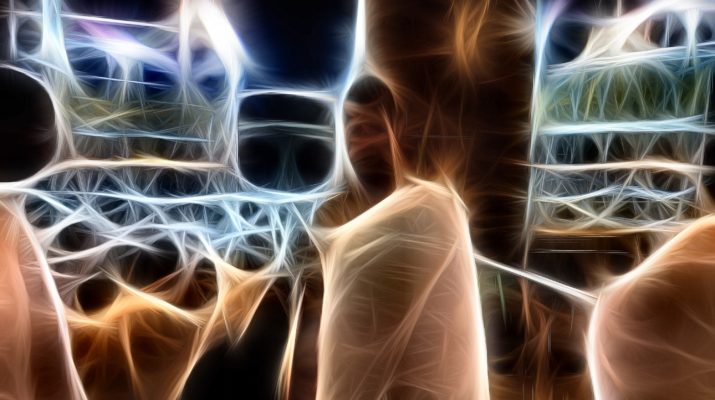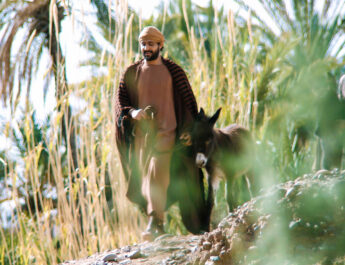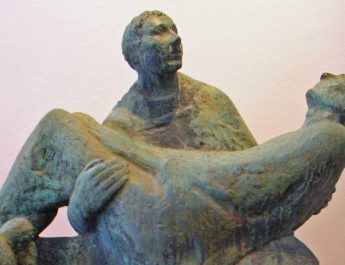Psalm 95:1-7
Transfiguration of the Lord – A Women’s Lectionary
1 O come,A let us singB to the Lord;C
A “come” = halak. This is go, come, walk. It is walk literally and figuratively and includes people and animals. It can be used figuratively for one’s moral life – how we walk according to God’s way or against it. It can also refer to the walk of life as in the course one’s life takes, the choices we make, etc.
B “sing” = ranan. This is a cry of joy or a joyful song. Properly, it is emitting a shrill sound, especially one of joy.
C “Lord” = YHVH. From havah (to be, become) or hayah (to come to pass, become, be). This is the name of the God of Israel, the self-existent and eternal one, the tetragrammaton. This pronunciation has been lost to time so “Lord” is generally used in its place.
let us make a joyful noiseD to the rockE of our salvation!F
D “make a joyful noise” = rua. To break or destroy something so figuratively, an ear splitting sound such as a call of alarm or a joyful sound.
E “rock” = tsur. From tsur (to confine, cramp, or bind in a literal or figurative sense; to besiege, assault, or distress). This is rock, stone, cliff, boulder, rocky. It can also be a refuge, a way to refer to God.
F “salvation” = yesha. From yasha (to deliver, defend, help, preserve, rescue, be safe. Properly, to be open, wide or free, which implies being safe. Used causatively, it means to free). This is salvation, deliverance, rescue, safety, welfare, liberty.
2 Let us comeG into his presenceH with thanksgiving;I
let us make a joyful noise to him with songs of praise!J
G “come” = qadam. Perhaps from qedem (front, formerly, before, east, eternal, everlasting, antiquity). This is to come in front or be in front and so meet, anticipate, confront, receive, or rise. It sometimes means to meet for help.
H “presence” = paneh. From panah (to turn, face, appear). This is face in a literal or figurative sense. It could be face, presence, anger, respect. It can also be used of God to indicate divine favor or presence.
I “thanksgiving” = todah. From yadah (to throw one’s hands into the air in a gesture of praise, to give thanks, or make a confession); from yad (hand, ability, power; hand in a literal sense; what one can do or the means by which one does it). This is properly extending one’s hand, which implies affirmation and adoration. It can be a song of thanksgiving, a choir of thanksgiving, confession, or praise. It can also be a thank offering.
J “songs of praise” = zamir. 7x in OT. From zamar (making music; used specially of music to worship God; music with singing, singing praise, singing psalms); may be from zamar (to trim or prune). This is a song, psalm, or other music accompanied with instruments.
3 For the Lord is a greatK God,L
and a great KingM above allN gods.O
K “great” = gadol. From gadal (to grow up, become great, become wealthy – to advance. The root meaning may be to twist in the sense of the process of growing). This is great, high, bigger, noble, old, marvelous. It can also refer to someone who is powerful or distinguished.
L “God” = El.
M “King” = melek. From malak (to be or become king or queen, to rise to the throne, to be crowned; by implication, to take counsel). This is king or royal.
N “all” = kol. From kalal (to complete). This is all or every.
O “gods” = elohim. Related to “God” in v3. See note L above.
4 In his handP are the depthsQ of the earth;R
the heightsS of the mountainsT are his also.
P “hand” = yad. Related to “thanksgiving” in v2. See note I above.
Q “depths” = mechqar. 1x in OT. From chaqar (to penetrate; so, to thoroughly investigate, examine, ponder, or seek out). This is a range, depth, recess. It can also mean something scrutinized.
R “earth” = erets. Root may mean to be firm. This is earth, ground, field land, or country.
S “heights” = toaphah. 4x in OT. Perhaps from ya’aph (to be faint, tire, be weary). This is peak, horn, eminence. It ca also imply toil and therefore that which one gains from toil – a good, strength.
T “mountains” = har. From harar (hill or mountain). This is mountain, hill, hilly region.
5 The seaU is his, for he madeV it,
and the dry land,W which his hands have formed.X
U “sea” = yam. Root may mean to roar. This is the sea, often referring to the Mediterranean. It comes from the root in the sense of the roar of crashing surf. This word is sometimes used for rivers or other sources of water. It can mean to the west or to the south.
V “made” = asah. This is to make, do, act, appoint, become in many senses.
W “dry land” = yabbesheth. 2x in OT. From yabbashah (dry land dry ground); yabesh (to dry up, be withered, be dry; to be ashamed, confused, or disappointed). This is dry land or dry ground.
X “formed” = yatsar. Perhaps related to yatsar (to be narrow, distressed, or vexed); perhaps related to tsarar (to bind, restrict, narrow, be cramped, an adversary). This is to fashion or form, perhaps by squeezing something into a shape or form. Particularly, it is to create as a potter does. Figuratively, it is to determine.
6 O come,Y let us worshipZ and bow down,AA
let us kneelBB beforeCC the Lord, our Maker!DD
Y “come” = bo. This is to enter, come in, advance, fulfill, bring offerings, enter to worship, attack. It can also have a sexual connotation.
Z “worship” = shachah. This is to bow down, make a humble entreaty, to do homage to royalty or to God.
AA “bow down” = kara. This is to bow, crouch, kneel down, subdue. It is to bend the knee in many senses. It can also mean to smite, a woman crouching in childbirth, or bowing to worship God.
BB “kneel” = barak. This is to kneel, to bless. It is blessing God as part of worship and adoration or blessing humans to help them. It can be used as a euphemism to say curse God.
CC “before” = paneh. Same as “presence” in v2. See note H above.
DD “Maker” = asah. Same as “made” in v5. See note V above.
7 For he is our God,EE
and we are the peopleFF of his pasture,GG
and the sheepHH of his hand.
EE “God” = Elohim. Same as “gods” in v3. See note O above.
FF “people” = am. From amam (to darken, hide, associate; creating shadows by huddling together). This is people or nation. It can be used specifically for a tribe, collectively of troops or armies, or figuratively to refer to a flock of animals.
GG “pasture” = marith. 10x in OT. From raah (to graze, tend a flock, keep company with; to pasture in a literal or figurative sense). This is shepherding, pasturage, a flock.
HH “sheep” = tson. This is a flock of sheep and goats.
O that todayII you would listen toJJ his voice!KK
II “today” = yom. Root may mean being hot. This is the day in a literal or figurative sense. It can also mean birth, age, daylight, continually or other references to time.
JJ “listen to” = shama. This is to hear, call, consent, or consider. It implies listening intelligently, giving attention, and, because of these two factors, obedience and action are often implied.
KK “voice” = qol. This is a sound, used often for human voices. Also used when God speaks or angels, animals or instruments. It can be a cry or a noise, thunder or earthquakes and so on.
Image credit: “A GATHERING OF THE FAITHFUL …” by Bill Strain, 2008.




